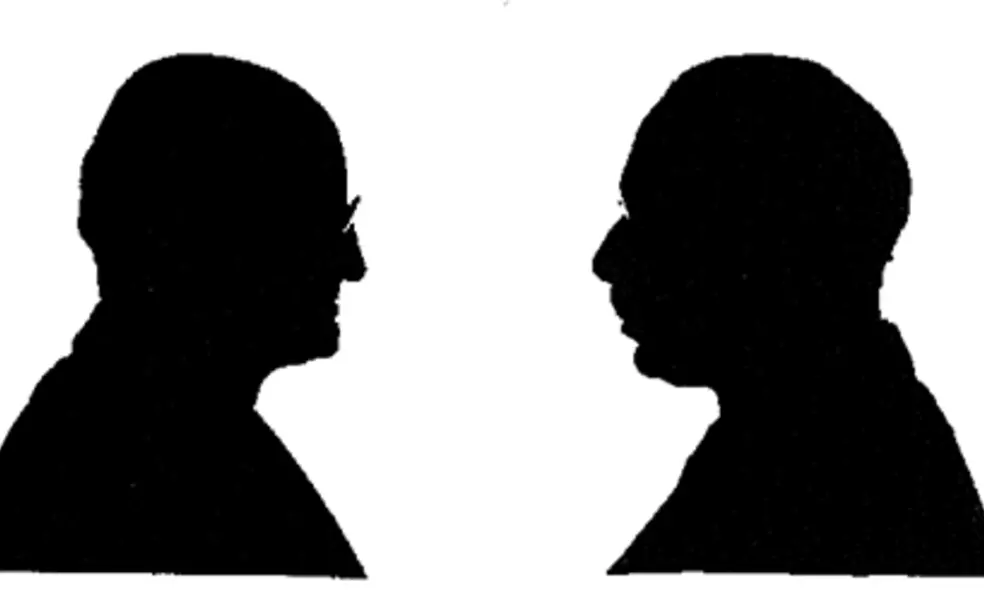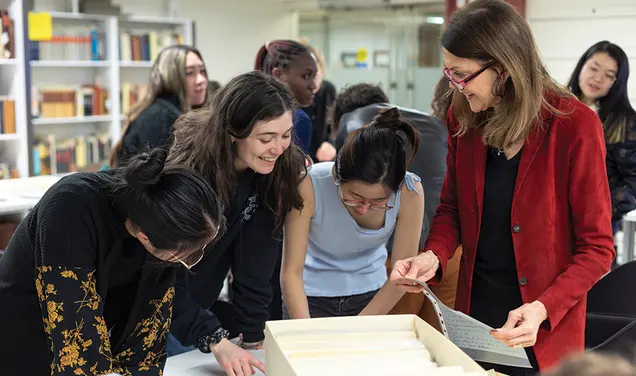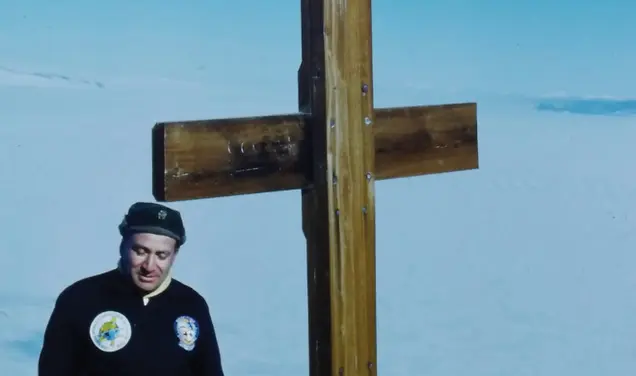A Tale of Two Deans
William K. Zinnser ’44, who is featured in one of our Lives Lived and Lost essays, wrote this story for the Nov. 9, 1965, issue of PAW.
Going to Princeton during World War II was quite different from going at any other time. Our education had the quality of a speeded-up movie — it was jerky, disconnected and slightly unreal, and all the more unreal because we knew that at any moment the movie could end, as for most of us it did. The chilly draft of the draft board blew our class, little by little, to the extreme corners of the earth, and nothing ever put it together again.
Those of us who entered Princeton between 1940 and 1944 probably still wonder how much we missed by not having four normal years, neatly bounded by freshman rituals at one end and a proper graduation at the other. Judging by previous installments of “Princeton in Retrospect,” it is somewhere in this gradual process that the undergraduate, maturing like a slow and uncertain wine, glimpses the meaning of a Princeton education.
But there’s more than one way to skin a tiger, and the meaning of Princeton can pop out at a boy when he is least looking for it. In my own case, I wouldn’t trade my stunted education for the usual kind. For it was the chance nature of wartime that gave me a vivid meeting with two of Princeton’s great deans — one before I left and the other when I returned — and joined the two encounters across the years with what seemed to be the personal attention of a Princeton President.
At the time of Pearl Harbor our class was only several months into its sophomore year. The event threw the campus into a disarray so total that it is still clear twenty-five years later. We felt that it was our duty to run out and enlist; yet in the swirl of rumors we heard that “Washington” wanted us to stick around and get educated for the war effort. Washington, of course, didn’t know what it wanted in those first days, and had bigger things to think about anyway.
Nevertheless the University had all the answers within a week. President Dodds convened a meeting of the entire college in Alexander Hall, where he told us that “Washington” wanted us to stay until we were called up. How he pierced the bureaucratic fog so swiftly I can’t imagine, but it was one of the early miracles of the war era. He then announced the University’s program of “accelerated” courses, summer sessions and other crash projects that would stuff our minds and strengthen our beer-weakened bodies for the Nation’s Service.
Harold Dodds’ High
These were the first solid facts to enter our suddenly-fuzzy world, and we seized them with pitiful gratitude. Though most college presidents would probably rather be remembered for their purely academic leadership, Harold Dodds reached a high peak in his career that night—and maintained it during the four shaky years that followed. Sensitive to our helplessness, he gave us a rock where we could stand and get our balance. In fact, he seemed to be the only college president who organized his troops with any speed at all. During Christmas vacation our friends from other colleges asked us what Princeton’s program was. Nobody had told them anything, but they had heard that we knew “the whole picture.”
So began the age of acceleration at Princeton. Through the winter, spring and summer of 1942 we took courses that were mysteriously elided. Thus we became part junior before we finished being sophomores, and we never did know how many credits we were amassing. But that didn’t matter—the main thing was that we were amassing wisdom, which Washington in its own wisdom would later to harness to smash the Axis. Meanwhile various gruff men of the gymnastics and physical education staff, whom we had naturally never seen before and who were all named “Pop,” worked with ill-concealed dismay to build our muscles. Washington wanted us to be tough.
By the end of summer, inevitably, the texture of college life began to come apart. The war was not going well, and students and teachers began flocking into uniform. When September came and a new academic year began, so many people had left that nobody knew who was still around, and one persistent rumor said that the University would close “within three months.”
I was then editor of the Nassau Sovereign, and we decided to put a special issue of the magazine that would tie the loose ends into a coherent picture. President Dodds wrote an introduction, and I felt that the issue should also have a piece by Dean Gauss on the dilemma of the liberal arts college and the liberal arts student when only the arts of war were wanted.
Deadline For A Dean
Dean Gauss was then in his mid-sixties and burdened with the extra chores of war-time, and I’m sure he would have given anything not to have to write an article on the dilemma of the liberal arts student. But he smiled wanly and agreed. The deadline arrived and I was holding a large space in the front of the magazine. I put my problem to the Dean’s secretary.
“When do you absolutely need it?” she asked.
“Early tomorrow,” I told her. She said to come back in the morning, and I did, waiting outside the Dean’s door with the special trepidation that is reserved for boys in that spot, whatever their errand. By now I was sure that the Dean just hadn’t been able to find time, and I would have been the first to understand.
Soon the door opened and Dean Gauss came out. He looked tired and he fixed me accusingly with his eyes, which had only a vestige of their usual twinkle.
“Do you know,” he said, “ that you kept an old man up all night?”
He gave me several sheets of paper on which his essay was scribbled and laboriously revised. What he had written was reflective, and yet it was practical as well. It addressed the immediate moment, as a dean’s advice should, but it also reaffirmed the longer values in the lives of boys and colleges. In the words that he wrote, and in the generous manner of his writing them, I saw condensed into one moment all the thirty-seven years that Dean Gauss had then spent at Princeton—years that began when Woodrow Wilson brought him there as one of the original young preceptors—and saw something of the humanistic stamp that the man and the institution had put on each other.
A few months later I left Princeton myself and enlisted in the Army. By then I was part-senior, part-junior, my credits so tangled that I didn’t know how many more I would need to graduate. But I was ready to go, and anyway I knew from Dean Gauss’s essay that the liberal arts would keep.
My next three credits I earned merely by putting on a uniform, ill-fitting though it was. Princeton decided that time spent in the service was time well spent, and certainly it is true that I learned more liberal arts in the Army than I ever did in McCosh Hall—though I don’t think I expected the University to be wise enough to realize this.
We were informed of the decision, as I recall, in one of the letters that President Dodds sent periodically to all of us who had gone off to war. They were warm letters, keeping us in touch, telling us that we were remembered, and they were all the more welcome because they came unannounced, catching up with us in places where we never expected to be.
One reached me, for instance, in a sand-blown tent near the Algerian town of Blida, at the base of the Atlas Mountains, and it enclosed a complete list of Modern Library titles. The University would like to send us three books, President Dodds wrote, and if we would just check our choices he would try to get them to us as soon as possible. I did, and the books reached me in a snow-blown tent near the Italian town of Brindisi. My choices were bulky classics that I had never had time to read, like Tristram Shandy. I had time now, and Laurence Sterne and I ploughed through the cold winter of 1945 together.
In May the war finally ended, and again “Washington” didn’t know what to do with me—or with any of its servicemen in the Italian theater. Europe had first priority on troopships taking soldiers home, and we were forgotten. So began a summer as empty as the last summer in Princeton had been full—a summer of that strenuous idleness which only Army officers can devise, taxing their ingenuity to give their men daily jobs that don’t need doing.
In July, however, the Army established a college at Florence to occupy at least some of us. Hungry for more credits, whatever strange form they might take, I applied before anybody else in my unit did and was therefore allowed to go. Our campus was an aeronautical academy built by Mussolini in the 1930’s in his best neo-Italian style. It was several miles west of the city, and from my dormitory window I had a fine view of Giotto’s tower and the soaring pink dome of the Cathedral.
I knew nothing about art, so I elected to take various courses in art appreciation. It seemed the perfect time and place, and it was. That was the summer when Italy was re-installing all the works of art that had been hidden in safety during the war. In the morning I would go to class and see slides of these works; then in the afternoon I would go into town and see the works themselves. I tried to find out when the famous pieces were expected back, and so managed to look Cellini’s Perseus in the eye as it was being hauled up to its old pedestal by block and tackle. I met Donatello’s St. George man-to-man, instead of as a tourist gawking upward, and Michelangelo’s David.
A crowd usually gathered to watch these statues entering again into the life of the city where they had spent so many centuries. It was a re-Renaissance—the same process that had taken place four hundred years earlier when an artist finished one of his works and the whole town turned out to greet it and decide if it was good or bad. Art belonged to the people then, and in that summer of 1945 it belonged briefly to the people again.
For me, a temporary Florentine, it was the richest of all summers. On weekends, filling in other corners of my new-found education in art and architecture, I hitch-hiked to surrounding towns that were almost as satisfying—to Siena and San Gimignano, to Volterra and Pisa and Lucca. When autumn came and my term was over, I received three certificates testifying that I had passed three courses. But only I knew how much more they certified.
In November a huge troopship at last came to Naples and took 8,000 of us home. Disgorged into civilian life, I was momentarily balked—everything depended on whether my certificates would give me enough credits to graduate. If not, I would have to return to Princeton for one more semester. This was something that I had been eager to do when I left. I thought it would be important to sew up the broken fabric of my undergraduate life. But now I didn’t want to go back. College was behind me; I wanted to be given my degree and to start fresh.
My hopes were not high, however, on the day when I went to Princeton for an appointment with the official who would judge my case. Some technicality would bar my path to freedom, and the certificates that I was clutching—the pieces of paper so gratifyingly won at Florence—now looked crude, shorn of all academic authority, as I walked across the campus to Nassau Hall. The old building started me down with its accumulated weight of ivy and tradition.
I entered timidly and was told that my appointment was with Dean Root. Dean Root! I might as well turn around and go right back to New York. Where was kindly Dean Gauss? Or kindly Dean Anyone Else? I had never met Dean Root, but I had taken his sophomore English course and listened week after week to his lectures. Stern lectures they were, raining on our unappreciative heads the fruit of lifelong scholarship, excavating with dry precision the buried ironies of Swift and the unsuspected jests of Pope—which, even then, we continued not to suspect.
My only other view of Dean Root was at the head of the formal procession that entered chapel every Sunday morning. Gray and solemn, bowed under robes representing the highest honors of Academia, he had the look of Oxford or Cambridge and not of the mere New World. Surely such a man as this, dean of Princeton’s faculty and guardian of its scholastic virtue, would scorn the grab-bag of credits that I now emptied at his feet.
He studied my Princeton record gravely and said nothing. Then he studied my certificates from Florence and said he had never seen anything like them before. Evidently, though the Army also established colleges in such places as Biarritz and Heidelberg, I was the first survivor to come home and tell the tale. Then he began counting up my credits. It was the moment I had waited for, and yet I could see that he wasn’t sure how much weight to give my Army learning. He shook his head and mumbled that I seemed to be a little short of the necessary total.
And then, imperceptibly, the dry dean disappeared and I was talking with a person. Could it be the same Dean Root, this warm old man who wanted to know what I had done and thought and felt in North Africa and Italy? Was this the face that had cowed three generations of undergraduates since he, too, was brought to Princeton as a young preceptor by Woodrow Wilson? I found myself talking to him with enthusiasm, telling him about my summer in Florence and my visits to the nearby towns. By then I was certain that I didn’t have enough credits and that the official part of my interview was over. Not until later did I realize that this was the only part that really mattered to Dean Root. Credits were just so many numbers; but an education was something else again.
At the end, a look of sadness came into Dean Root’s eyes and he said: “Tell me—I suppose Siena is completely destroyed?”
I told him that Siena hadn’t been touched by the war and that the great Cathedral was still there on top of the hill.
Dean Root smiled and saw me to the door. He promised that the University would let me know its decision soon. Not long afterward he wrote to say that I had met the requirements for a degree and that if I would like to come to Alexander Hall on a certain day in January, 1946, I could receive my diploma. I never knew for sure, but I have always suspected that Dean Root waived one or two missing credits to make the total come out right.
And I think to this day that if the Cathedral of Siena had been destroyed, I would have had to go back for another term.










No responses yet